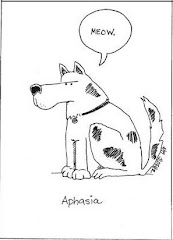Saturday, October 17, 2009
Article 2: Treating Visual Speech Perception to Improve Speech Production in Aphasia
I found this article through pub med. It is about improving visual speech perception to help speech production in aphasia patients. Ten patients were used in the experiment which consisted of undergoing computer picture testing. Two different tests were done and then compared to get the results. The first test was matching pictures to words that the patients heard without visualization of someone speaking and the second was matching words that the patient heard through a video of the speaker saying the words. The patients did significantly better when they had a visual of the person saying the word than just hearing it. When the patient only heard the word they did not improve their matching abilities but they did improve when a speaker was present.
National Institutes of Health 40, 853-858. Treating Visual Speech perception to Improve Speech Production in Non-Fluent Aphasia by Julius Fredriksson, Julie Baker, Janet Whiteside and Chris Rorden.
National Institutes of Health 40, 853-858. Treating Visual Speech perception to Improve Speech Production in Non-Fluent Aphasia by Julius Fredriksson, Julie Baker, Janet Whiteside and Chris Rorden.
Article 1: Syntactic Facilitation in Agrammatic Sentence Production
I found this article through pub med. It talks about the syntactic abilities of someone with aphasia and the research they found after computing tests on patients with aphasia. The experiment consisted of twelve control patients and twelve aphasia patients. Three different areas were covered and tested. These included spontaneous speech, picture description with preparation and help, and picture description without help. The results showed that Brocas patients were most successful when prepared for the task and that they worked off short term memorization instead of actual knowledge.
Brain and Language 62, 221 - 254. Syntactic Facilitation in Agrammatic Sentence Production by Robert J. Hartsuiker and Herman H. J. Kolk.
Sunday, October 4, 2009
http://www.aphasia.org/
The National Aphasia Association
This is a nonprofit organization that promotes public education, research, rehabilitation and support services to assist people with aphasia and their families. I like this site because it provides a lot of helpful information about aphasia and support groups to help you and your family cope with the disorder.
http://www.aphasiahope.org/index.jsp
Aphasia Hope Foundation is a non-profit foundation that has a two-fold mission: (1) to promote research into the prevention and cure of aphasia and (2) to ensure that all survivors of aphasia and their caregivers are aware of and have access to the best possible treatments available. I like this site because it provides insightful tips for living with aphasia and shares personal experiences of aphasia survivors.
http://www.strokeassociation.org/presenter.jhtml?identifier=1200037
The American Stroke Association is a division of the American Heart Association that focuses on reducing risk, disability and death from stroke through research, education, fund raising and advocacy. I appreciate this site because aphasia comes from having a stroke. It provides helpful tips in reducing the risk of a stroke and support groups for stroke victims and their families.
The National Aphasia Association
This is a nonprofit organization that promotes public education, research, rehabilitation and support services to assist people with aphasia and their families. I like this site because it provides a lot of helpful information about aphasia and support groups to help you and your family cope with the disorder.
http://www.aphasiahope.org/index.jsp
Aphasia Hope Foundation is a non-profit foundation that has a two-fold mission: (1) to promote research into the prevention and cure of aphasia and (2) to ensure that all survivors of aphasia and their caregivers are aware of and have access to the best possible treatments available. I like this site because it provides insightful tips for living with aphasia and shares personal experiences of aphasia survivors.
http://www.strokeassociation.org/presenter.jhtml?identifier=1200037
The American Stroke Association is a division of the American Heart Association that focuses on reducing risk, disability and death from stroke through research, education, fund raising and advocacy. I appreciate this site because aphasia comes from having a stroke. It provides helpful tips in reducing the risk of a stroke and support groups for stroke victims and their families.
Subscribe to:
Comments (Atom)



